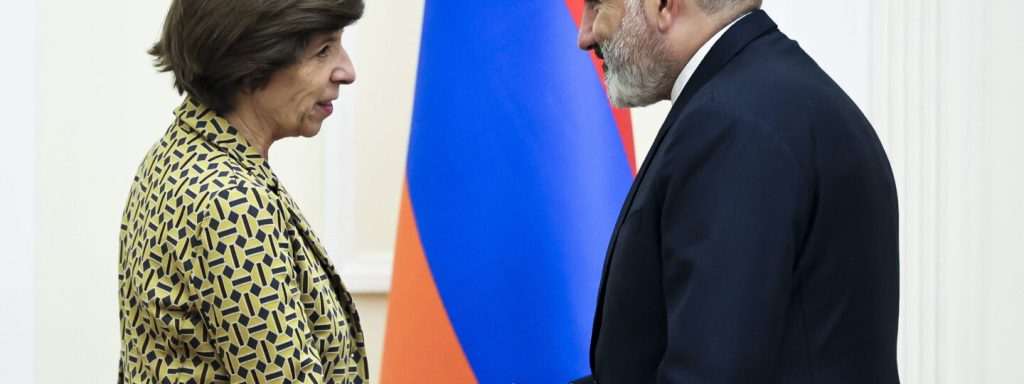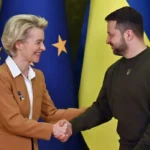If the conflict between Armenia and Azerbaijan over Nagorno-Karabakh has lasted for more than 30 years, the reversal of the balance of power between the two States worries part of the international community which fears that Azerbaijan will continue its offensive in the weeks that follow. The President of Azerbaijan, Ilham Aliev, has also explicitly mentioned, alongside Recep Tayyip Erdogan, his desire to open the “Zangezur corridor”. A land strip, located on the territory of Armenia, the opening of which would connect the main territory of Azerbaijan to the enclave of Nakhchivan and Turkey. After the conquest of Nagorno-Karabakh, an incursion into Armenian territory could take a new dimension to the conflict. A look back at the origins of this crisis and the reasons for Armenia’s diplomatic isolation.
“The Russian security alliance has become harmful for Armenia”
A former socialist republic, Armenia maintained close ties with Russia after the fall of the USSR, particularly in terms of security. The deterioration of relations with Russia plays a direct role in the weakening of Armenia’s territory. “Today, ties with Russia are quite cold. From the start, the choice to put its security in the hands of Russia was constrained since Armenia was surrounded by Turkey and Azerbaijan,” explains Claire Mouradian, research director at the CNRS and head of the “Caucasus” team. » from the EHESS Center for the Study of the Russian, Caucasian and Central European Worlds.
Armenia, a member of the Collective Security Treaty Organization, a military alliance formed at the initiative of Russia and heir to the Warsaw Pact, maintains a relationship of necessity with Russia which has been deteriorating in recent years. If Russia let Azerbaijan seize Nagorno-Karabakh, it is quite simply because “Russian interests, particularly economic, are no longer in the Armenian camp. In 1994, at the end of the first war, Russia wanted to preserve a balance in the region,” recalls Claire Mouradian. The trans-Anatolian gas pipeline from Azerbaijan to Italy represents a major strategic challenge for Russian gas markets. An observation shared by Taline Papazian, political scientist lecturer at Sciences Po Aix and director of the Armenia Peace Initiative, who believes that “the Russian security alliance has become harmful to Armenia over the past 2 and a half years, and is in crisis open for a year. »
Ties with Russia, a scarecrow for Western powers
“The ties between Armenia and Russia have been a repellent for many Western states,” recalls Taline Papazian. The long-maintained proximity between Armenia and Russia is today largely responsible for Armenia’s isolation on the international scene. For historian Claire Mouradian, historical reasons explain the isolation of a state “caught between the logic of empire which is perpetuated, whether on the side of Turkey or Russia”. A situation which pushes Armenia to the margins of the Western camp. Without it being directed towards Russia, the Armenian Parliament ratified the Rome Statute in order to integrate the International Criminal Court (ICC). Joining the ICC could then allow Armenia to prosecute Azerbaijan for war crimes. A first step to obtain broader international support and make people understand a conflict sometimes considered “too complicated” by Westerners.
“In its support for Armenia, France is a pioneer in Europe”
France, which maintains historical links with Armenia, particularly since the genocide, is working hard to support Armenia which is “currently under-equipped militarily to defend itself against Azerbaijan”, explains Taline Papazian. “In its support for Armenia, France is a pioneer in Europe and the most daring among Western countries,” continues Taline Papazian. Despite this status as the main ally of the Western camp, support from France, which has little presence in this geographical area, remains limited. If France has increased the humanitarian aid it provides to Armenia by seven million, the sum is considered insufficient to respond to the displacement of 100,000 refugees from Nagorno-Karabakh. On the other hand, France could prove to be a major diplomatic relay for Armenia, especially at the level of the European Union. “Germany, at the instigation of France, has notably increased its level of attention to the region’s problems,” informs Taline Papazian.
Concretely, the positions are extremely varied between very active France and Hungary which refuses any action against Azerbaijan. This veto also prevents starting negotiations for the imposition of European sanctions against the Ilham Aliev regime. It is therefore impossible to see the European Union mobilize and support Armenia militarily in the event of aggression as is the case with Ukraine? “Arms deliveries are still sensitive in the European Union, even with the precedent of the war in Ukraine. The European Union, even if its credibility is damaged, has set aggression against the territory of Armenia as a red line,” concludes Laure Delcour.
This article is originally published on publicsenat.fr







